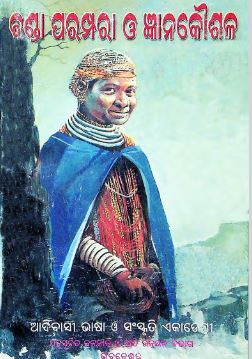Rajkisor Mahana’s “Banda Parampara O Gyanakousal,” published in 2004, stands as a significant contribution to Odia literature, delving into the rich tapestry of Odisha’s tribal culture and traditions. This essay book not only highlights the unique customs and practices of the Banda community but also serves as a critical examination of the deeper knowledge systems embedded within these traditions.
The Banda community, a tribal group in Odisha, is known for its distinct way of life that is intricately connected to nature and spirituality. Mahana’s work provides readers with an in-depth understanding of the socio-cultural dynamics of the Banda people, revealing how their traditions are intertwined with their environmental practices. The essays contained within the book are insightful reflections on the various aspects of tribal life, including festivals, rituals, art forms, and the oral traditions that have been passed down through generations.
Mahana systematically discusses the concept of tradition in the Banda community, situating it within a broader cultural context. He emphasizes that traditions are not just remnants of the past; they are living practices that continue to evolve. His exploration of Banda customs illustrates how these traditions reflect the community’s identity and values, serving as a means of resilience in the face of modern challenges. By juxtaposing traditional practices with contemporary issues, Mahana highlights the ongoing relevance of tribal customs in today’s world
One of the key themes in “Banda Parampara O Gyanakousal” is the relationship between knowledge and tradition. Mahana posits that the Banda people possess a wealth of indigenous knowledge that encompasses agriculture, medicine, and ecological conservation. This knowledge, often overlooked by mainstream society, is critical for sustainable living and offers valuable insights into alternative ways of engaging with the environment. The book encourages readers to recognize the significance of this indigenous wisdom, advocating for its preservation and appreciation. Through vivid examples, he illustrates how the Banda community uses their traditional knowledge to navigate challenges posed by modernization and climate change.
Cultural practices among the Banda people, such as music, dance, and storytelling, also receive considerable attention in Mahana’s essays. He showcases how these art forms serve as vehicles for communication and expression, allowing the community to articulate their experiences, beliefs, and aspirations. The rhythms of Banda music and the vibrant movements of their dances carry historical and cultural narratives that are pivotal in maintaining communal bonds. Mahana’s vivid descriptions of these cultural expressions bring to life the vibrant ethos of the Banda community, inviting readers to appreciate the aesthetic richness of tribal traditions.
In conclusion, “Banda Parampara O Gyanakousal” by Rajkisor Mahana is not merely an academic text but a celebration of the Banda community’s cultural heritage. It invites readers to reflect on the importance of preserving indigenous knowledge and traditions in an ever-globalizing world. By amplifying the voices of the Banda people, Mahana emphasizes that even in the face of modernity, the essence of tradition remains a vital part of cultural survival. This book is a must-read for those interested in anthropology, cultural studies, and the vibrant mosaic of India’s tribal heritage, and it serves as a poignant reminder of the wisdom embedded in traditional practices that can guide contemporary society towards more sustainable futures.
Books Info
| Books name | Banda Parampara O Gyanakousal |
| Author | Rajkisor Mahana, C. |
| No Of pages | 336 |
| Publisher | NA |
| Publication | 2004 |
| Printed At | Laxmi Art Printers |
| Distributor | NA |

